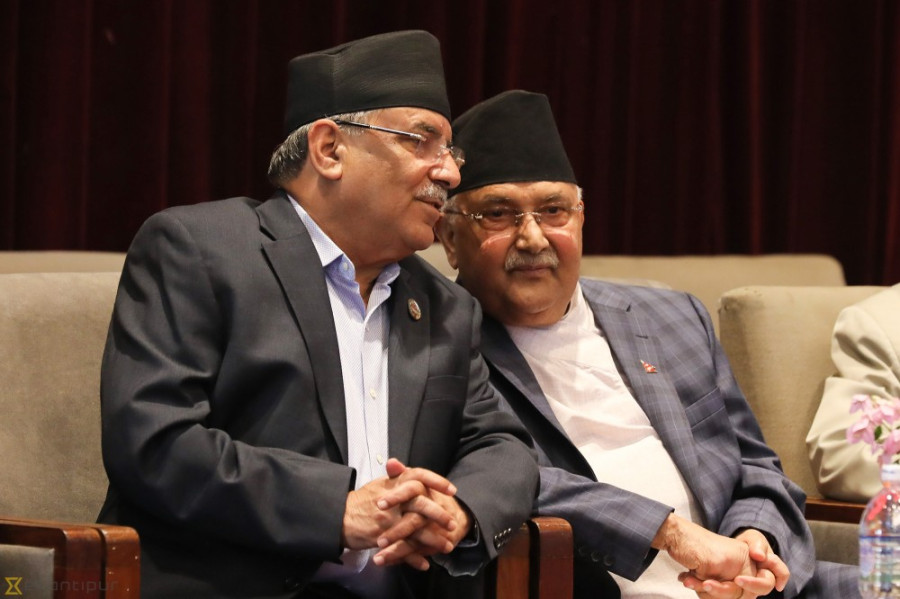National
Covid-19 could’ve united the ruling party but it has only exposed already frayed divisions
Oli has taken Dahal’s proposal to form an all-party mechanism personally as an attempt to oust his government, party insiders say.
Tika R Pradhan & Anil Giri
The Covid-19 crisis could have led the Nepal Communist Party to remain united, given the pressures that the ruling party would be under while dealing with the pandemic. But the crisis has only exposed the fault lines more clearly, leaving the two chairs—and the factions they lead—even further apart.
While party chair and Prime Minister KP Sharma Oli is struggling to assuage concerns from the public as well as party members over his poor handling of the coronavirus crisis, Pushpa Kamal Dahal, the other chair, has sowed seeds of suspicion by proposing the formation of an all-party mechanism.
It is no secret that Oli and Dahal have not been on the best of terms in recent months. The growing rivalry was perhaps most explicit during the selection of the candidate for the Speaker’s post. That conflict between the two chairs never really went away, say party insiders.
“Oli’s behaviour leaves Dahal feeling like he is being sidelined, and this is not doing any good to the party,” said a party Secretariat member.
Dahal’s proposal to form an all-party mechanism by including the opposition “to assist the government in the fight against Covid-19” has been seen by the Oli faction as a ploy against the government, said the party leader.
The proposal came days after a heated argument between Oli and Dahal at last week’s Secretariat meeting. At the meeting, which was held hours after Oli addressed the nation, Oli was roundly questioned by Secretariat members regarding corruption allegations in the procurement of medical equipment from China. Leaders say Oli took those questions personally, as a bid to corner him, and accused the Dahal faction of not supporting him in a time of crisis.
According to party General Secretary Bishnu Poudel, no discussion has been held in the party regarding an all-party mechanism.
“If the proposal had come after proper consultations, there would not have been any misunderstanding,” Poudel told the Post. “The sudden proposal led to confusion.”
It was apparent on Saturday that the all-party mechanism had not gone down well with Oli. During a video conference with chief ministers from all seven provinces, Oli outright rejected the idea.
Of the nine members in the Secretariat, leaders like Bamdev Gautam, Narayan Kaji Shrestha and Jhalanath Khanal have supported Dahal’s proposal, in line with the Bhaisepati alliance–an arrangement that Dahal had managed to create by winning over these former UML leaders to corner Oli.
The ruling Nepal Communist Party currently has three factions that are precariously aligned. The third camp led by senior leader Madhav Kumar Nepal currently holds the key, say insiders.
Nepal, who after being driven into a corner by Oli, had decided to ally with Dahal but seems to have now mended fences with Oli.
“And that has given Oli the leverage to counter Dahal,” said a central committee member who did not want to be identified. “His involvement in the Baluwatar land grab has become a headache for Madhav Nepal at this point in time. Oli has been employing that to keep Nepal on his side.”
But those from the Nepal camp call the Oli-Nepal alliance a natural one.
“Oli and Nepal should join hands to run the party and the government while taking the Maoists along and giving them the respect they deserve,” said Raghuji Pant, a standing committee member.
After extracting the Speaker’s post for the man of his choice, Dahal had by and large bounced back, increasing his hold on the party. But Oli went into a kidney transplant, which meant confinement and fewer internal exercises. Then, the Covid-19 crisis hit, and insiders say Oli managed to assert his leadership as there was a lull during the lockdown.
But again, two of Oli’s ministers ran into controversy over the procurement of medical equipment, giving Dahal an opening.
The Dahal camp has tried to take advantage of the situation to attack Oli, which was evident in the latest Secretariat meeting, as action was demanded against those involved in corruption, said one party leader.
A central committee member who has close relations with Nepal claimed that the differences between the Oli and Dahal factions are also reflected in their loyalists’ allegations against each other.
“The government has largely failed, but those leaders who are close to the government are refusing to admit it,” said Maheswor Dahal, a central committee member. “To cover up their weaknesses, they are making unnecessary allegations and calling the all-party mechanism proposal a ploy against the government.”
According to Dahal, the all-party mechanism is solely aimed at assisting the government in a time of crisis.
But there are others who say that the differences between the leaders stems from their working styles.
“All top leaders have a history of exercising power,” said Bishnu Rijal, a standing committee member. “Dahal has a dynamic personality; he wants to remain active but he is currently sitting idle. Hence, he is looking for some role to play in this difficult time.”
Rijal ruled out any serious differences between the two leaders.
“Their nature and working styles are different. That’s it,” he said. “There’s not much to read into it.”




 19.12°C Kathmandu
19.12°C Kathmandu















